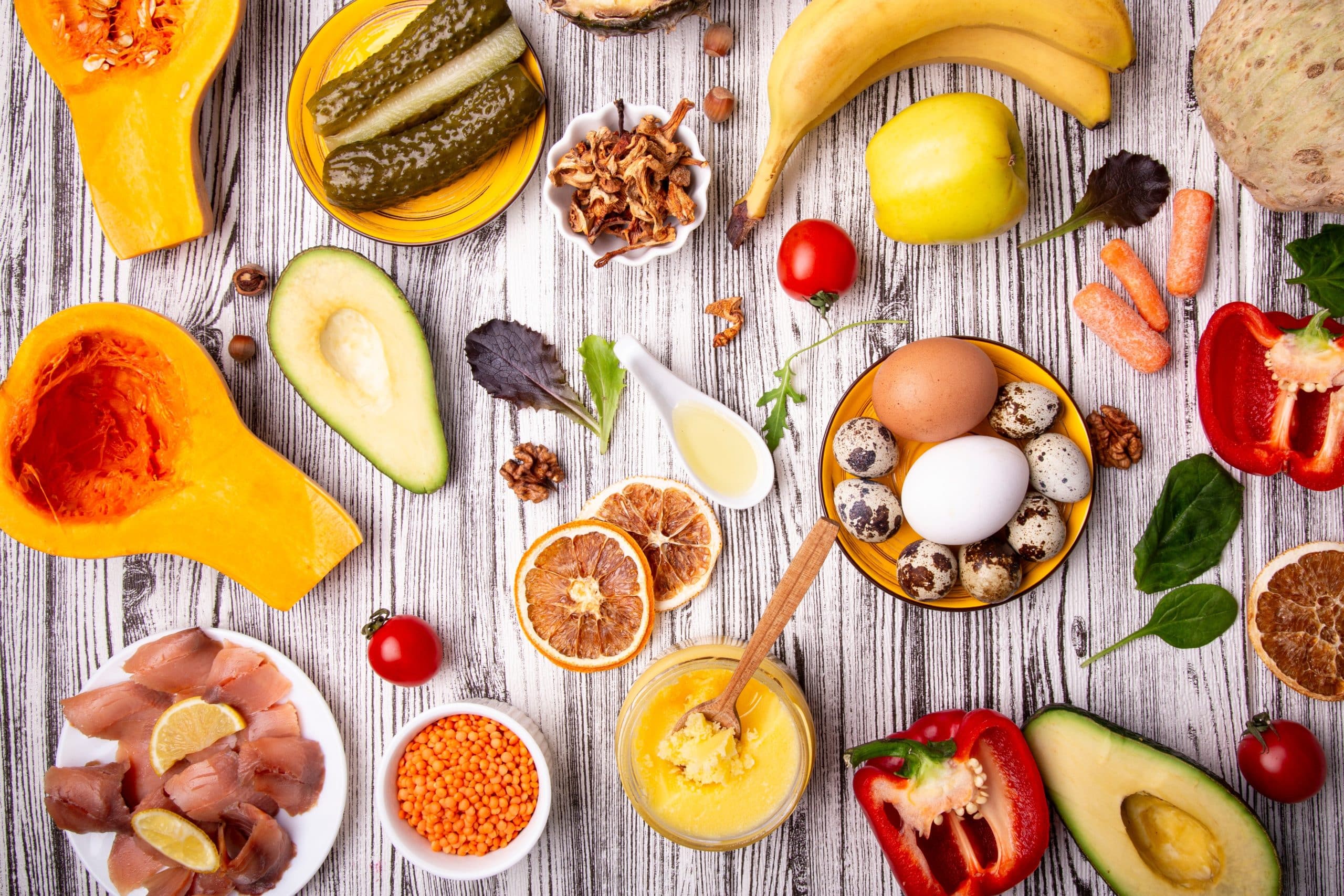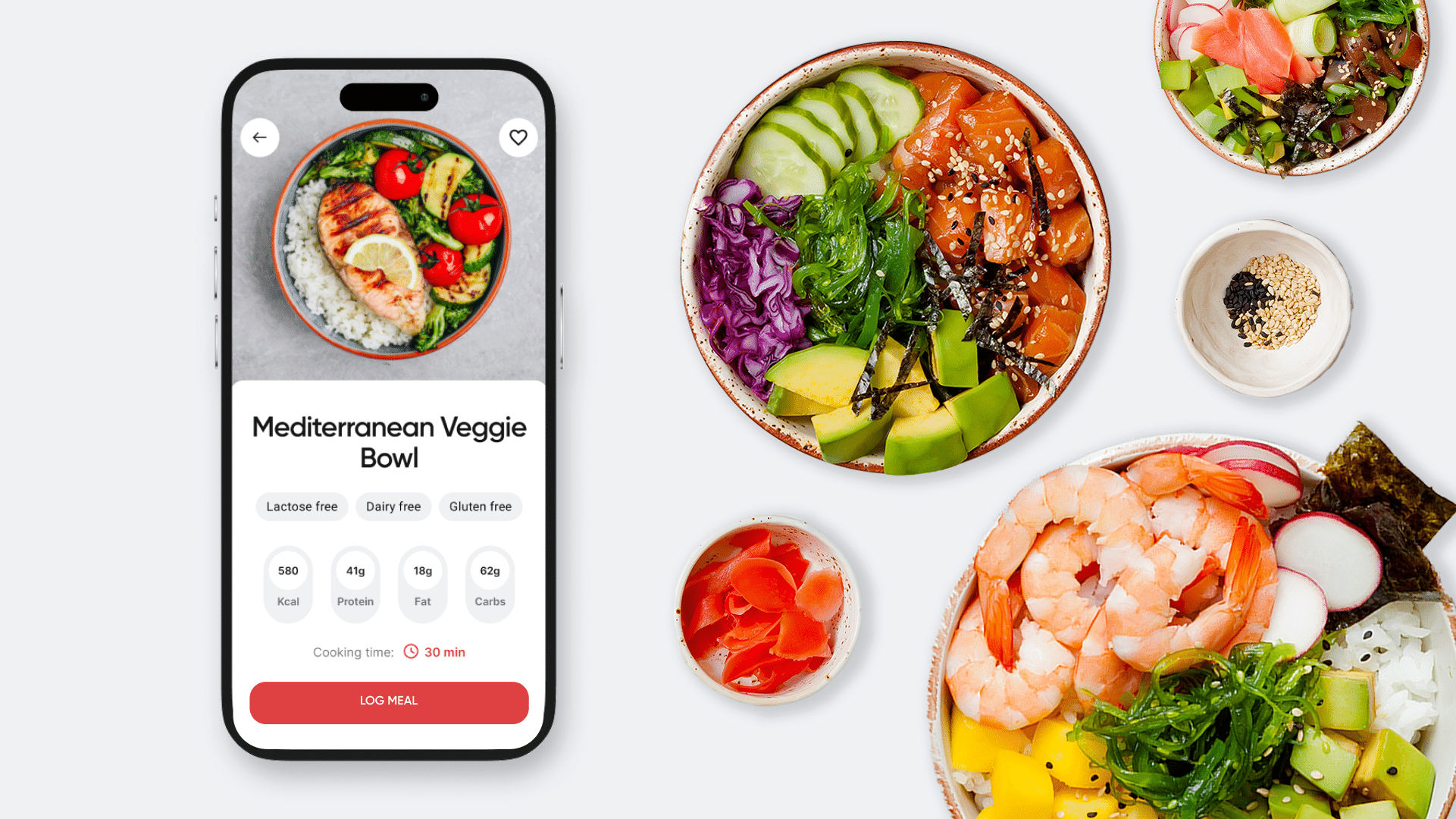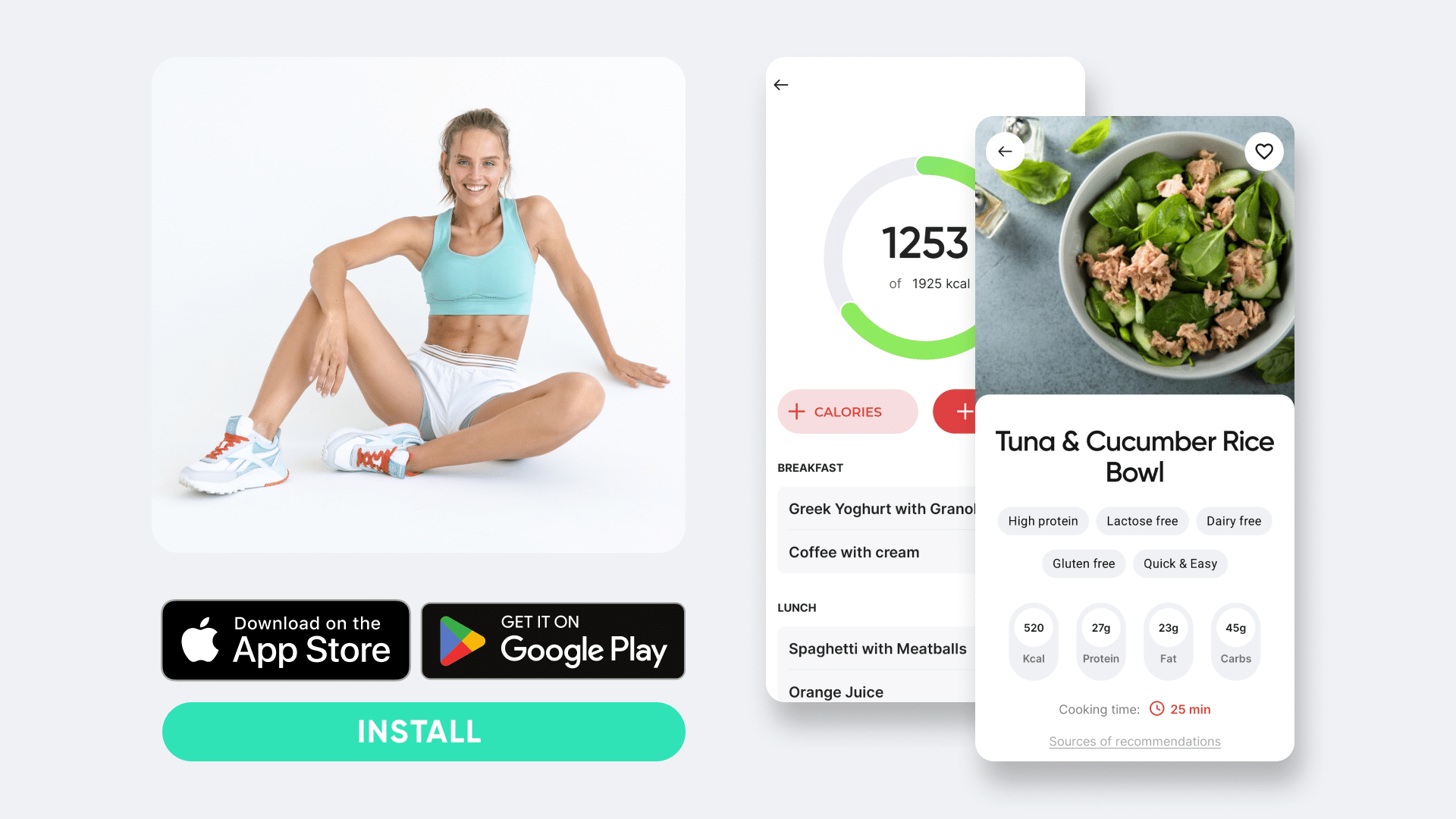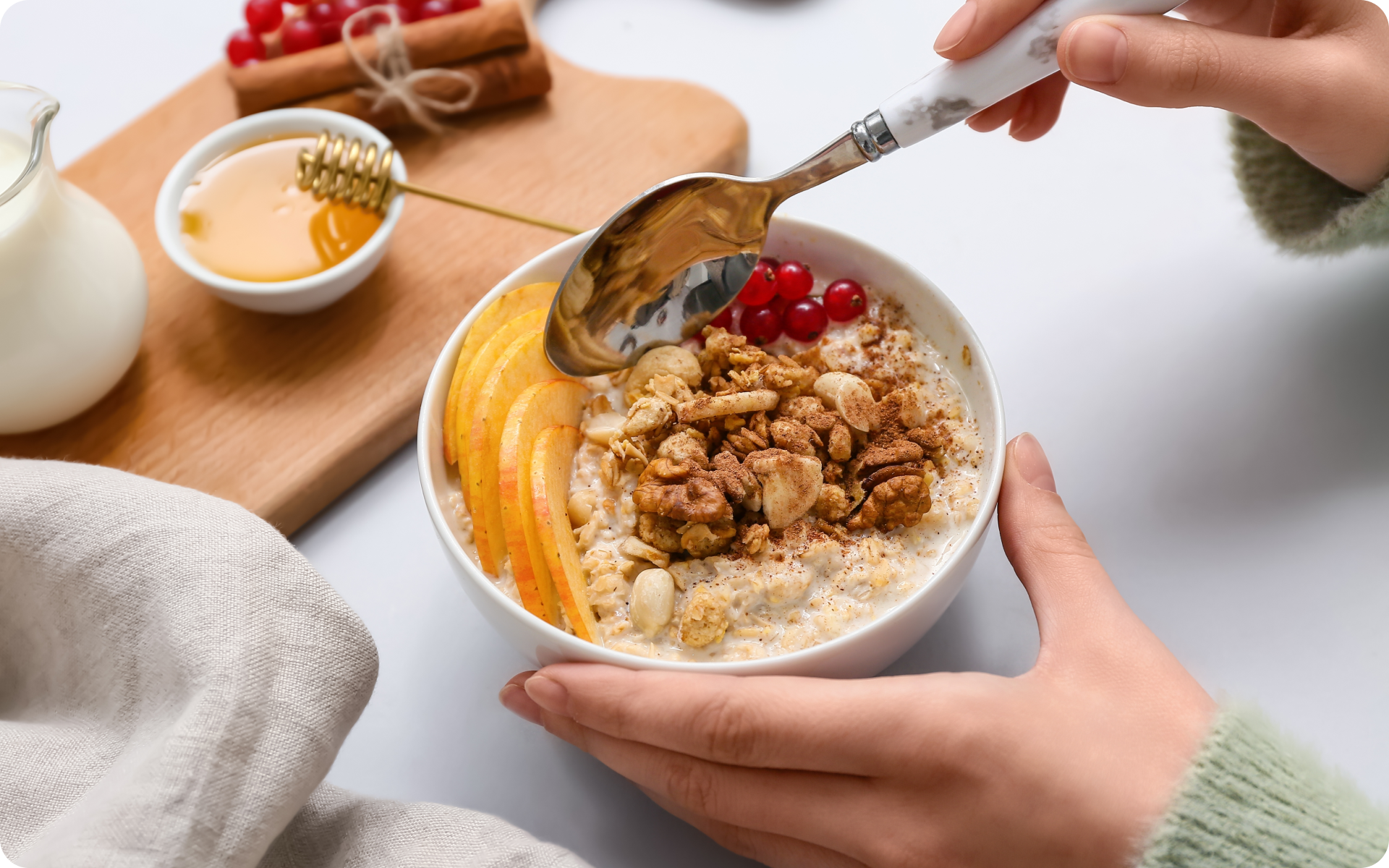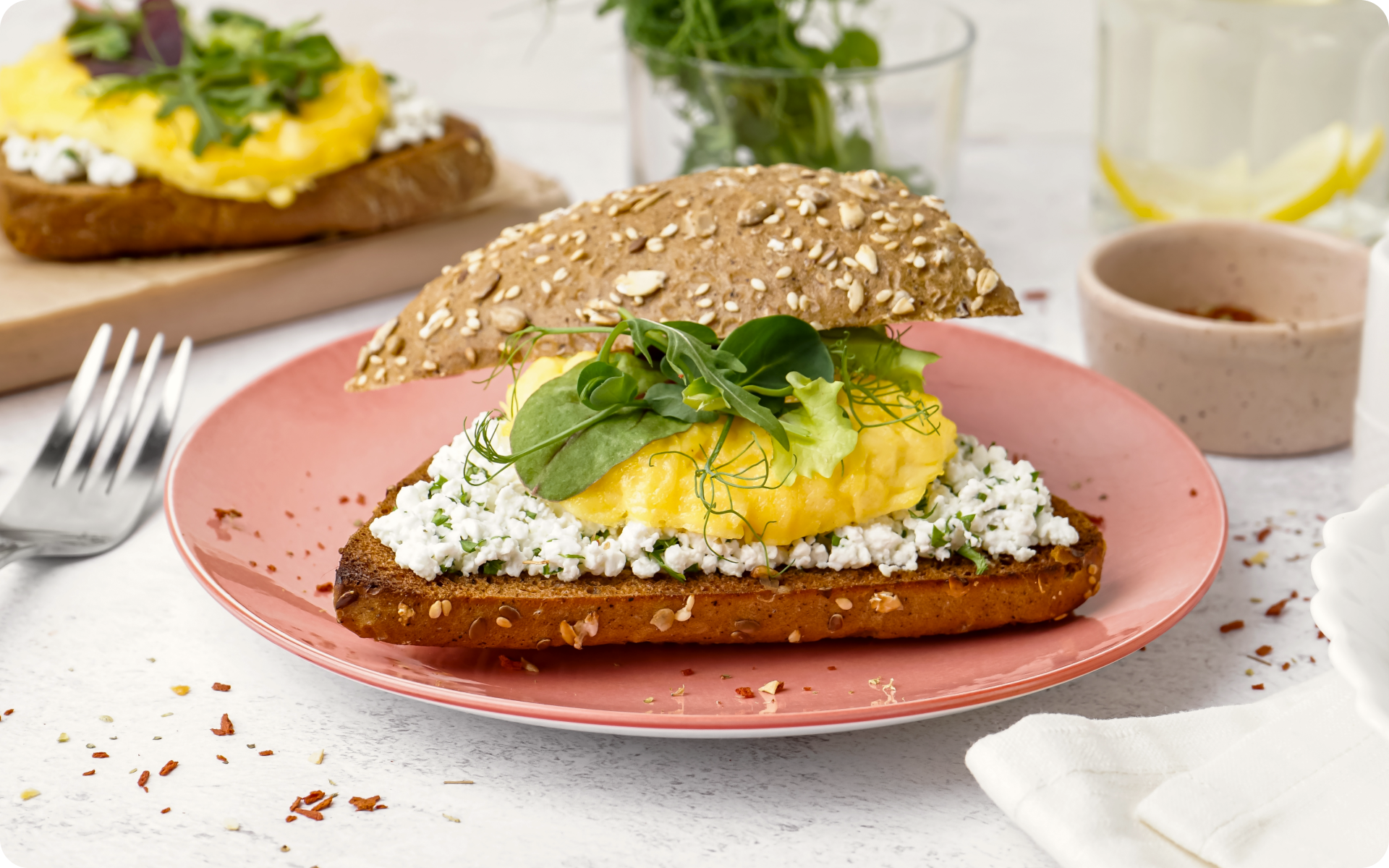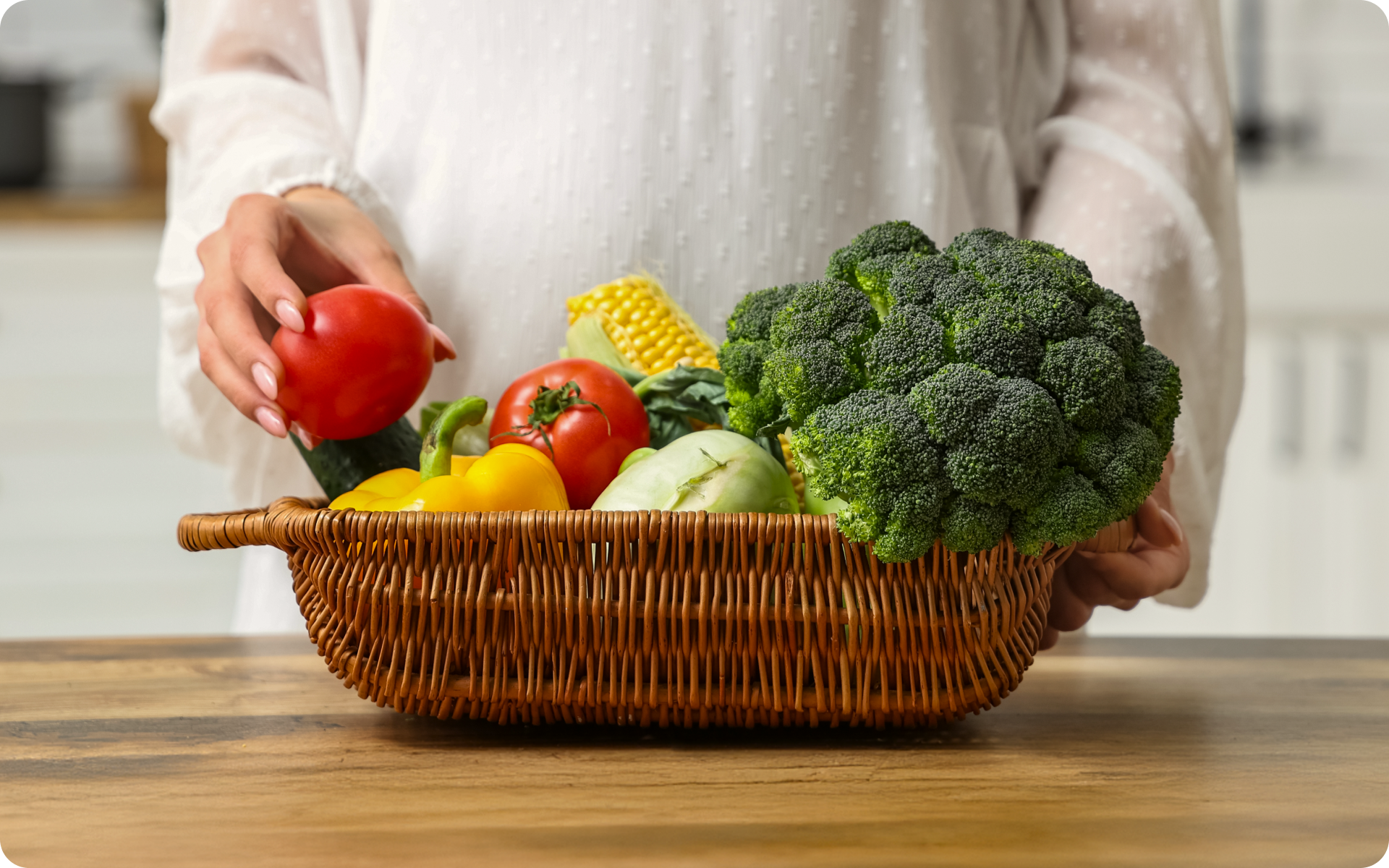A calorie deficit is the holy grail of weight loss (8), predicated on the simple equation of burning more calories than one consumes. By eating fewer calories and moving more, you’re primed to shed pounds.
But there’s such a thing as cutting too close to the bone. Eating too little can not only stall your metabolism but also lead to muscle loss, rather than fat loss. You may even find your energy levels severely depleted, making it harder to maintain physical activity.
While cutting calories, 1200 is often cited as a minimum to prevent nutritional deficiencies and maintain energy levels; however, dropping below this threshold risks impeding your health and well-being, and over time, it could lead to serious health issues. Note that, for some people, this threshold is higher than 1200 calories.
That said, here’s what you need to weigh in on: Is a 1250-calorie meal plan sustainable, nutritious, and effective for weight loss, or does it skirt too close to an unhealthy deficit?
Is 1250 a Calorie Deficit?
1250 is certainly a calorie deficit; regardless of age, weight, or gender, it falls below the average recommended intake for all healthy adults. However, the exact calorie deficit needed to lose weight varies from person to person and depends on such factors as: activity level, muscle mass, and metabolism.
For some individuals, a 1250-calorie meal plan may be an appropriate deficit that allows them to steadily lose weight without feeling excessively hungry or fatigued. However, for others this amount may be too low and could lead to negative side effects (1).
Is 1250 Calories a Day Healthy?
1250 calories a day can be healthy for some individuals, but not for others. If it’s appropriate for you, it’s important to consider the quality and nutrient density of the foods chosen within this calorie limit.
A diet consisting of mostly ultra processed, high-calorie, low-nutrient foods is not a healthy option, even if it falls within a 1250-calorie limit.
On the other hand, a well-balanced meal plan consisting of mostly whole, nutrient-dense foods that provide essential vitamins and minerals can be a healthy choice for weight loss (3).
It’s crucial to meet your body’s nutritional needs, while cutting calories to ensure you’re not compromising your health in the process.
To know whether a 1250-calorie meal plan is healthy for you, consider the following:
- Are you cutting more than 500-1000 calories per day from your previous calorie level or your estimated energy expenditure?
- How does your body respond to this calorie deficit?
- Are you meeting all of your daily nutrient requirements?
- How do you feel physically and mentally while following this meal plan?
- What is your activity level and do you have enough energy to sustain it?
- Will you be able to maintain this low-calorie intake for a prolonged period, without any negative effects on your health?
- Are you losing weight at a sustainable and healthy pace (1-2 pounds per week)?
Yanking yourself back in shape has never been so easy with our game-changing fitness app! Start transforming your life with BetterMe!
How Many KG Will I Lose Eating 1200 Calories a Day?
Almost everyone will lose weight while eating 1200 calories a day. However, the amount of weight lost will depend on various factors such as genetics, energy needs, and activity level (5).
On average, a deficit of 500 to 1000 calories per day can lead to losing 1-2 pounds (0.5-1kg) per week (13). This means that if you consistently eat 1200 calories a day and for you that is a deficit of 500-1000 calories from your total daily energy expenditure, you might expect to lose approximately 4-8 pounds (2-4kg) per month.
However, it’s important to note that weight loss is not always linear and may plateau or vary week by week. It’s also crucial to consider the quality of weight lost – whether it’s fat, muscle, or water weight. Maintaining a balanced and sustainable approach to weight loss is key to long-term success (14).
In a previous blog; How Can I Lose 1 Pound a Day, we warned of the dangers of crash diets that promise rapid and extreme weight loss. These types of diets typically involve severely restricting calories and can lead to serious health consequences.
Sample 1200 Calories a Day Meal Plan
Planning your meals ahead of time can help you stick to your calorie goal and be sure of a balanced intake of nutrients (7).
In the case of a 1250 calorie meal plan for weight loss, planning takes most of the guesswork out of your daily food consumption and allows you to focus on healthy, nutrient-dense options.
Simple 1200 Calorie Meal Plan High Protein
A high protein diet is often recommended for weight loss, as it can help increase satiety, preserve muscle mass, and boost metabolism (2). This 1200-calorie meal plan focuses on high protein, whole foods that follow a Paleo approach (4).
Day 1
- Breakfast: Baked eggs in ham with guacamole on tostada (328 calories)
- Lunch: Baked salmon with almond parsley and steamed broccoli (367 calories)
- Snack: Peach and strawberry smoothie (128 calories)
- Dinner: Scallion crusted salmon with cherry tomato, dull and anchovy salad (378 calories)
Macros: 1201 calories, 60.8 g net carbs, 62 g fat, 85.8 g protein, 23.5 g fiber
Day 2
- Breakfast: Spinach scrambled eggs with lemon berry smoothie (298 calories)
- Lunch: Cilantro lime shrimp with balsamic asparagus (349 calories)
- Snack: Tuna in cucumber cups (190 calories)
- Dinner: Skinny blackened tilapia and mixed greens with sliced cucumber and avocado
Macros: 1206 calories, 49 g net carbs, 67 g fat, 90.5 g protein, 25.7 g fiber
Day 3
- Breakfast: Almond flour pancakes and grilled peaches with honey (303 calories)
- Lunch: Paleo ground beef stir-fry with brussels sprouts slaw (318 calories)
- Snack: Cucumber cups with tapenade (177 calories)
- Dinner: Simple lemon herb chicken and spinach tomato salad (399 calories)
Macros: 1196 calories, 47.8 g net carbs, 81.2 g fat, 62.4 g protein, 21.4g fiber
Read more: A Beginner Intermittent Fasting Meal Plan To Fit Your IF Journey
Day 4
- Breakfast: Tomato and egg scramble (316 calories)
- Lunch: Maple glazed chicken with garlic spinach (277 calories)
- Snack: Blueberry blast smoothie (208 calories)
- Dinner: Easy paleo garlic chicken with kale avocado salad (404 calories)
Macros: 1205 calories, 54.7 g net carbs, 72 g fat, 72.4 g protein, 29.9 g fiber
Day 5
- Breakfast: Paleo porridge (335 calories)
- Lunch: Hard-boiled egg salsa boats with brussel sprouts in duck fat (304 calories)
- Snack: almonds (164 calories)
- Dinner: Mustard and shallot salmon with balsamic arugula salad (397 calories)
Macros: 1200 calories, 31.8 g net carbs, 87.1 g fat, 58.9 g protein, 23.5 g fiber
1250 Calorie Meal Plan Vegetarian
The vegetarian diet has gained popularity for its health benefits and weight loss potential (12). This 1250 calorie meal plan provides a balanced vegetarian option, including plenty of vegetables, plant-based protein sources, and healthy fats (4).
Day 1
- Breakfast: Avocado-egg toast and classic fruit salad (341 calories)
- Lunch: Open-face roasted tomato sandwich with brie and celery (356 calories)
- Snack: Strawberry banana Greek yogurt (141 calories)
- Dinner: Cheesy vegan noodles with garlic green beans (409 calories)
Macros: 1247 calories, 112 g net carbs, 55.1 g fat, 53.1 g protein, 34.8 g fiber
Day 2
- Breakfast: Greek yogurt with blue and black berries and Turkish style zucchini fritters (336 calories)
- Lunch: Kale, peppers, tomatoes and cashew scramble and an orange (356 calories)
- Snack: Mozzarella tortilla pizza with stir fried mixed veggies in soy sauce (362 calories)
- Dinner: Tropical smoothie (192 calories)
Macros: 1246 calories, 115.5 g net carbs, 49.3 g fat, 69.1 g protein, 29.5 g fiber
Day 3
- Breakfast: Peanut butter yogurt oatmeal with blueberries (362 calories)
- Lunch: Spinach and black bean skillet with instant creamy onion soup (382 calories)
- Snack: Kiwi berry smoothie (148 calories)
- Dinner: Cauliflower fried rice with carrots and hummus (359 calories)
Macros: 1250 calories, 136.9 g net carbs, 43,3 g fat, 58.3 g protein, 42.9 g fiber
Day 4
-
- Breakfast: Banana protein pancakes with carrot orange juice (313 calories)
- Lunch: Sauteed kale with pinto bean salad (349 calories)
- Snack: Spicy jicama sticks (190 calories)
- Dinner: Kidney bean quesadillas with lebanese fresh thyme tomato salad (400 calories)
Macros: 1252 calories, 125.3 g net carbs, 42.3 g fat, 53.6 g protein, 52.8 g fiber
Day 5
-
- Breakfast: Scrambled eggs and broccoli with ginger and greens smoothie (330 calories)
- Lunch: Pumpkin ravioli with zesty honey kale (348 calories)
- Snack: Toast with tomato onion and hummus (188 calories)
- Dinner: Cheesy vegan zoodles with strawberry and walnut spinach salad (386 calories)
Macros: 1253 calories, 108 g net carbs, 51.2 g fat, 65.3 g protein, 46 g fiber
If you wish to cinch your waist, tone up your bat wings, blast away the muffin top – our fitness app was created to cater to all your needs! BetterMe won’t give excess weight a chance!
1250 Calorie Meal Plan Low Carb
Eating a low-carb diet has been linked to weight loss, improved blood sugar control, and other health benefits for some people (11). This 1250 calorie meal plan incorporates low-carb options while still providing essential nutrients and a variety of food choices (4).
Day 1
- Breakfast: Onion and tomato omelet (300 calories)
- Lunch: Paleo lettuce bacon and turkey wraps with grilled asparagus (295 calories)
- Snack: Tuna mex tuna salad (199 calories)
- Dinner: Grilled salmon with dill butter and zucchini spears (456 calories)
Macros: 1250 calories, 19.5 g net carbs, 89.7 g fat, 86.4 g protein, 12.5 g fiber
Day 2
- Breakfast: Zucchini hash with bacon (318 calories)
- Lunch: Ham and avocado egg wrap with easy sauteed spinach (348 calories)
- Snack: Cucumber cups with Tapenade(177 calories)
- Dinner: Grilled mackerel with lemon parmesan salad (406 calories)
Macros: 1250 calories, 27.4 g net carbs, 97.2 g fat, 59.7 g protein, 12.3 g fiber
Day 3
- Breakfast: Mushroom and asparagus scramble and pecans (335 calories)
- Lunch: Cilantro turkey burgers with spinach tomato salad (364 calories)
- Snack: Cream cheese and ham pickles (111 calories)
- Dinner: Boiled mackerel with onion and pickle butter with steamed broccoli (414 calories)
Macros: 1251 calories, 25.5 g net carbs, 87 g fat, 86.2 g protein, 15.6 g fiber
Day 4
- Breakfast: Bell pepper egg-in-a-hole and papaya flaxseed shake (357 calories)
- Lunch: Simple spicy garlic shrimp with sauteed eggplant (330 calories)
- Snack: Ginger zinger trail mix (145 calories)
- Dinner: Pan fried t-bone with sauteed kale (426 calories)
Macros: 1257 calories, 25.8 g net carbs, 96.6 g fat, 66.4 g protein, 7.2 g fiber
Day 5
- Breakfast: Caprese eggs and portabella mushrooms with keto protein shake (330 calories)
- Lunch: Shrimp avocado mango salad with brussel sprouts in duck fat (307 calories)
- Snack: Black olives with cheddar (192 calories)
- Dinner: Peppered steaks with blue cheese with baked zucchini (425 calories)
Macros: 1254 calories, 33.6 g net carbs, 81.4 g fat, 88 g protein, 17.7 g fiber
1250 Calorie Meal Plan for Women (Mediterranean Diet)
Women have unique nutritional needs, and it’s important to consider these when planning their diet. The Mediterranean diet has been shown to be beneficial for women’s health and weight loss (10).
A Mediterranean diet is a healthy choice for men too; however, they may need to adjust the portion sizes to meet their specific needs. This 1250 calorie meal plan provides a Mediterranean-inspired approach with a focus on whole foods, healthy fats, and plenty of fruits and vegetables (4).
Day 1
- Breakfast: Cinnamon French toast and grilled peaches with honey (374 calories)
- Lunch: Tomato and feta bruschetta with boiled kale (301 calories)
- Snack: Blueberry and maple cottage cheese whip(185 calories)
- Dinner: Hummus and grilled vegetable wrap with Mediterranean salad (368 calories)
Macros: 1255 calories, 155 g net carbs, 36.8 g fat, 55.4 g protein, 25 g fiber
Day 2
- Breakfast: Berry banana smoothie bowl with cottage cheese and cantaloupe (369 calories)
- Lunch: Mozzarella tortilla pizza with mango pineapple smoothie (337 calories)
- Snack: Veggie nori roll (196 calories)
- Dinner: Quinoa black bean tacos and sauteed spinach with pine nuts (448 calories)
Macros: 1245 calories, 136 g net carbs, 46.9 g fat, 50.8 g protein, 34 g fiber
Day 3
- Breakfast: Zucchini scramble with chocolate date shake (342 calories)
- Lunch: Vegetarian bean burrito with Lebanese fresh thyme tomato salad (329 calories)
- Snack: Zesty bean dip and chips (186 calories)
- Dinner: Breaded pistachio crusted tilapia with onion and balsamic arugula salad (397 calories)
Macros: 1255 calories, 145 g net carbs, 43.2 g fat, 54.4 g protein, 22 g fiber
Day 4
- Breakfast: Cinnamon porridge with blueberries and Greek yogurt with peanut butter and peach toast (325 calories)
- Lunch: Maple glazed tilapia with cabbage cucumber salad (330 calories)
- Snack: Carrots with hummus (175 calories)
- Dinner: Quinoa tabbouleh and steamed broccoli with tomato (425 calories)
Macros: 1254 calories, 133 g net carbs, 48.6 g fat, 54.2 g protein, 39 g fiber
Day 5
- Breakfast: Coconut flour pancakes with fruit salad (309 calories)
- Lunch: Acini di pepe pasta with garlic and olives Lebanese white cabbage salad (333 calories)
- Snack: Cinnamon yogurt with sliced apple (165 calories)
- Dinner: Shiitake and scallion ramen with sauteed brussel sprouts with onion and garlic (446 calories)
Macros: 1253 calories, 141 g net carbs, 51.1 g fat, 40.5 g protein, 32 g fiber
Read more: Vegan Weight Loss Meal Plan and Prep Tips
1400 calories may or may not be too little, depending on individual needs. Highly active, larger individuals likely need more than 1400 calories to meet their daily energy requirements, while sedentary individuals or those with a smaller frame who want to lose weight, may do well with this level. Furthermore, the quality and nutrient density of food choices within this calorie intake play a significant role in determining whether it’s sufficient for an individual. Check out our blog: Is 30 Minutes of Exercise Enough to learn more about the importance of physical activity in weight loss and overall health. Losing 5kg in 5 days is a dangerous and unrealistic goal. Crash diets that promise rapid weight loss are not sustainable, and the weight that is lost, is often gained back quickly (9). Even if you succeed in losing 5kg in a short period, it’s likely that the weight lost is mostly water and muscle mass rather than fat. Focus on gradual, sustainable weight loss by creating a calorie deficit through a healthy diet and regular physical activity. In a previous blog – How Many Sit Ups to Burn 1000 Calories, we warned about the dangers of obsessing over calorie burn and emphasized the importance of creating a healthy balance between food intake and physical activity. You can lose 1kg a week when you first start a weight loss journey, but this rate may slow down over time. A safe and sustainable goal for weight loss is 1 to 2 pounds (0.5-1kg) per week (6). The initial weight loss may be faster due to fluid shifts and changes in food intake, but as you progress, the rate of weight loss will likely slow down. It’s important to focus on a long-term approach rather than trying to lose weight quickly. Calorie needs vary from one person to the next, but 1200 is often considered the minimum intake for adults to meet their nutritional needs. Consuming fewer than 1200 calories per day can lead to nutrient deficiencies, slowed metabolism, and other negative health effects (1). For some people, this threshold is higher than 1200 calories. It’s essential to consult a healthcare professional or a registered dietitian before drastically cutting your calorie intake.FAQs
Is 1400 Calories Too Little?
How Can I Lose 5kg In 5 Days?
Can I Lost 1kg a Week?
How Many Calories Is Too Little?
The Bottom Line
A 1250-calorie meal plan can be an effective tool for weight loss for the right person. However, it’s crucial to consider the individual needs and factors that go into creating a sustainable and healthy calorie deficit. It’s essential to prioritize nutrient-dense foods and listen to your body’s response while following this type of meal plan.
DISCLAIMER:
This article is intended for general informational purposes only and does not serve to address individual circumstances. It is not a substitute for professional advice or help and should not be relied on for making any kind of decision-making. Any action taken as a direct or indirect result of the information in this article is entirely at your own risk and is your sole responsibility.
BetterMe, its content staff, and its medical advisors accept no responsibility for inaccuracies, errors, misstatements, inconsistencies, or omissions and specifically disclaim any liability, loss or risk, personal, professional or otherwise, which may be incurred as a consequence, directly or indirectly, of the use and/or application of any content.
You should always seek the advice of your physician or other qualified health provider with any questions you may have regarding a medical condition or your specific situation. Never disregard professional medical advice or delay seeking it because of BetterMe content. If you suspect or think you may have a medical emergency, call your doctor.
SOURCES
- Calories (2022, ncbi.nlm.nih.gov)
- Clinical Evidence and Mechanisms of High-Protein Diet-Induced Weight Loss (2020, ncbi.nlm.nih.gov
- Defining the Optimal Dietary Approach for Safe, Effective and Sustainable Weight Loss in Overweight and Obese Adults (2018, ncbi.nlm.nih.gov)
- Eat This Much (n.d., eatthismuch.com)
- Factors affecting weight loss variability in obesity (2020, sciencedirect.com)
- Losing Weight | Healthy Weight, Nutrition, and Physical Activity (2023, cdc.gov)
- Meal planning is associated with food variety, diet quality and body weight status in a large sample of French adults (2017, biomedcentral.com)
- Optimal Diet Strategies for Weight Loss and Weight Loss Maintenance (2021, ncbi.nlm.nih.gov)
- Pandemic obesity and the contagion of nutritional nonsense (2003, pubmed.ncbi.nlm.nih.gov)
- The Mediterranean diet and health: a comprehensive overview (2021, onlinelibrary.wiley.com)
- The Potential Health Benefits of the Ketogenic Diet: A Narrative Review (2021, ncbi.nlm.nih.gov)
- Vegetarian and vegan diets: benefits and drawbacks (2023, ncbi.nlm.nih.gov)
- Weight loss: 6 strategies for success (2021, mayoclinic.org)
- Weight-Loss and Maintenance Strategies – Weight Management (2004, ncbi.nlm.nih.gov)
